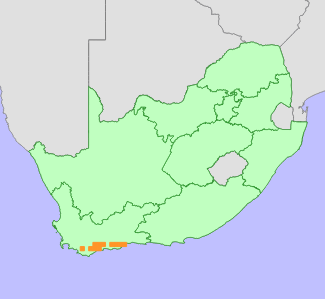|
Scientific Name | Oedera garnotii (Less.) N.G.Bergh |
Higher Classification | Dicotyledons |
Family | ASTERACEAE |
Synonyms | Nestlera garnotii (Less.) Harv., Nestlera tenuifolia DC., Polychaetia garnotii Less., Relhania garnotii (Less.) K.Bremer |
National Status |
Status and Criteria | Vulnerable A2bc |
Assessment Date | 2005/04/21 |
Assessor(s) | N.A. Helme & D. Raimondo |
Justification | A slow-growing, Overberg-endemic shrub. Common in the correct habitat, however, it has lost a minimum of 40% of its habitat to wheat cultivation over the past 60 years, and its habitat continues to be ploughed up. The minimum generation length is suspected to be 20 years. It therefore qualifies as Vulnerable under criterion A. |
Distribution |
Endemism | South African endemic |
Provincial distribution | Western Cape |
Range | This species occurs from Agulhas to Mossel Bay. |
Habitat and Ecology |
Major system | Terrestrial |
Major habitats | Mossel Bay Shale Renosterveld, Eastern Ruens Shale Renosterveld, Central Ruens Shale Renosterveld, Western Ruens Shale Renosterveld, Ruens Silcrete Renosterveld, Potberg Ferricrete Fynbos, Albertinia Sand Fynbos, Swellendam Silcrete Fynbos |
Description | Plants grow in lowland shale areas, especially silcrete. |
Threats |
| Wheat farming has and continues to transform the habitat of this species. At least 40% of its habitat has been transformed in the past 57 years. It is a long-lived shrub (over 20 years) and its habitat was transformed since the 1950s (Swellendam farmers pers. comm. with D. Raimondo). |
Population |
Population trend | Decreasing |
Conservation |
| It is conserved only in the De Hoop Nature Reserve. |
Assessment History |
Taxon assessed |
Status and Criteria |
Citation/Red List version | | Relhania garnotii (Less.) K.Bremer | VU A2bc | Raimondo et al. (2009) | | Relhania garnotii (Less.) K.Bremer | Insufficiently Known | Hilton-Taylor (1996) | | Relhania garnotii (Less.) K.Bremer | Uncertain | Hall et al. (1980) | |
Bibliography |
Goldblatt, P. and Manning, J.C. 2000. Cape Plants: A conspectus of the Cape Flora of South Africa. Strelitzia 9. National Botanical Institute, Cape Town.
Hall, A.V., De Winter, M., De Winter, B. and Van Oosterhout, S.A.M. 1980. Threatened plants of southern Africa. South African National Scienctific Programmes Report 45. CSIR, Pretoria.
Hilton-Taylor, C. 1996. Red data list of southern African plants. Strelitzia 4. South African National Botanical Institute, Pretoria.
Raimondo, D., von Staden, L., Foden, W., Victor, J.E., Helme, N.A., Turner, R.C., Kamundi, D.A. and Manyama, P.A. 2009. Red List of South African Plants. Strelitzia 25. South African National Biodiversity Institute, Pretoria.
Stafford, G.I., Wikkelso, M.J., Nancke, L., Jager, A.K., Moller, M. and Ronsted, N. 2016. The first phylogenetic hypothesis for the southern African endemic genus Tulbaghia (Amaryllidaceae, Allioideae) based on plastid and nuclear DNA sequences. Botanical Journal of the Linnean Society 181:156–170.
|
Citation |
| Helme, N.A. & Raimondo, D. 2005. Oedera garnotii (Less.) N.G.Bergh. National Assessment: Red List of South African Plants version 2024.1. Accessed on 2026/01/29 |
 Comment on this assessment
Comment on this assessment

